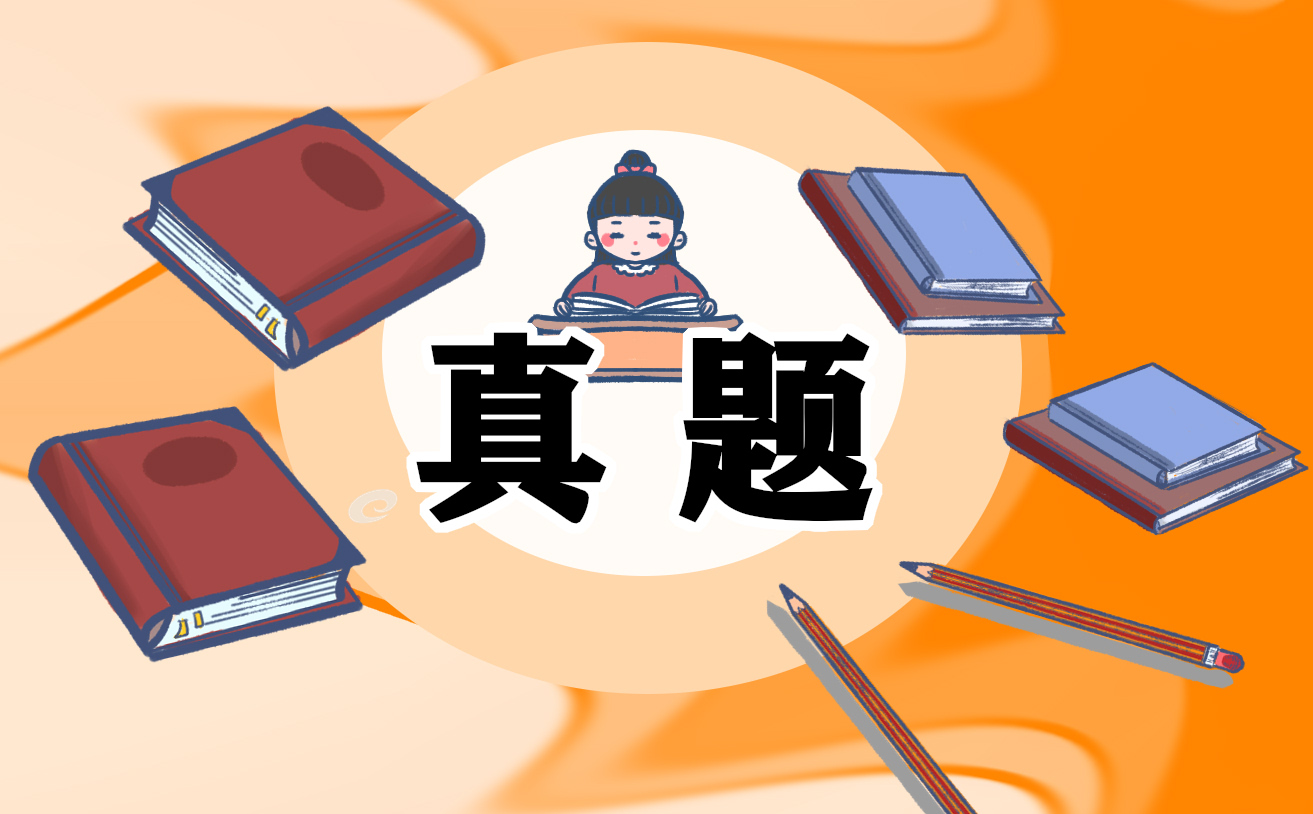當(dāng)我們?cè)趯W(xué)習(xí)單詞時(shí),要時(shí)刻聯(lián)系其背后的語(yǔ)境,在語(yǔ)境中學(xué)習(xí)單詞,掌握它在不同語(yǔ)境中的用法和含義,而不僅僅是掌握它的字面意思,要學(xué)會(huì)與語(yǔ)境結(jié)合,在語(yǔ)境中記憶單詞,下文是小編為你精心編輯整理的考研英語(yǔ)二級(jí)英譯漢真題,希望對(duì)你有所幫助,更多內(nèi)容,請(qǐng)點(diǎn)擊相關(guān)欄目查看,謝謝!

考研英語(yǔ)二級(jí)英譯漢真題1
46.Directions:
Translate the following text into Chinese. Write your translation neatly on the ANSWER SHEET. (15 points)
A fifth grader gets a homework assignment to select his future career path from a list of occupations. He ticks “astronaut” , but quickly adds “scientist” to the list and selects it as well. The boy is convinced that if he reads enough, he can explore as many career paths as he likes. And so he reads everything from encyclopedias to science fiction novels. He reads so passionately that his parents have to institute a “no reading policy” at the dinner table.
That boy was Bill Gates, and he hasn’t stopped reading yet--not even after becoming one of the most successful people on the planet. Nowadays, his reading material has changed from science fiction and reference books recently, he revealed that he reads at least 50 nonfiction books a year. Gates chooses nonfiction titles because they explain how the world works. “Each book opens up new avenues of knowledge,” Gates says.
一名五年級(jí)的學(xué)生的家庭作業(yè)要求他從一系列的職業(yè)中選出他未來(lái)的職業(yè)道路。他選擇了“宇航員”,但很快又將“科學(xué)家”加入名單,也選了這一職業(yè)。這個(gè)男孩確信如果他讀的書(shū)足夠多,他就能想探索多少條職業(yè)道路,就探索多少條。因此他讀書(shū)——從百科全書(shū)讀到科幻小說(shuō)。他如此狂熱地閱讀以致于他的父母不得不制定一條吃飯時(shí)“不能讀書(shū)”的規(guī)矩。這個(gè)男孩就是比爾·蓋茨,他從未停止過(guò)閱讀 – 即便在他成為全球最成功人士之后也如此。今天,比爾蓋茨的讀物已經(jīng)不再是科幻小說(shuō)和參考書(shū)目:最近,他表示自己每年至少閱讀50本非虛構(gòu)讀物。蓋茨選擇讀非虛構(gòu)類(lèi)圖書(shū),因?yàn)檫@些書(shū)解釋了世界是如何運(yùn)作的。“每本書(shū)都開(kāi)辟了探索新知識(shí)的道路。” 比爾蓋茨說(shuō)。
考研英語(yǔ)二級(jí)英譯漢真題2
46. Directions:
Translate the following text from English into Chinese. Write your translation on ANSWER SHEET 2. (15 points)
Think about driving a route that's very familiar. It could be your commute to work, a trip into town or the way home. Whichever it is, you know every twist and turn like the back of your hand. On these sorts of trips it's easy tolose concentration on the driving and pay little attention to the passing scenery. The consequence is that you perceive that the trip has taken less time than it actually has.
This is the well-travelled road effect: people tend to underestimate the time it takes to travel a familiar route.
The effect is caused by the way we allocate our attention. When we travel down a well-known route, because we don't have to concentrate much, time seems to flow more quickly. And afterwards, when we come to think back on it, we can't remember the journey well because we didn't pay much attention to it. So we assume it wasshorter.
想想看在一條非常熟悉的路上駕駛的感覺(jué),這可能發(fā)生在上班,進(jìn)城或回家的路上。無(wú)論如何,你會(huì)熟悉路上的每一個(gè)迂回曲折。在這類(lèi)旅行中,我們很容易會(huì)分散注意力并且不太關(guān)注路邊的風(fēng)景。結(jié)果就是你誤以為旅途比實(shí)際所用的時(shí)間要少。
這是美妙的旅程所產(chǎn)生的效果:人們往往會(huì)低估在熟悉的旅程中所用掉的時(shí)間。
我們分散注意力的方式會(huì)導(dǎo)致這種結(jié)果。當(dāng)我們?cè)谥穆吠局行旭倳r(shí),我們不必過(guò)于集中精力,時(shí)間似乎過(guò)得飛快。隨后,當(dāng)我們回想整個(gè)過(guò)程時(shí),由于沒(méi)有特別留神,會(huì)變得印象模糊。此時(shí),我們似乎會(huì)覺(jué)得這段旅程會(huì)更短些。
考研英語(yǔ)二級(jí)英譯漢真題3
Directions:
Translate the following text from English into Chinese. Write your translation on ANSWER SHEET 2. (15 points)
I can pick a date from the past 53 years and know instantly where I was , what happened in the news and even the day of the week. I’ve been able to do this since I was four.
I never feel overwhelmed with the amount of information my brain absorbs my mind seems to be able to cope and the information is stored away reatly. When I think of a sad memory, I do what everyone does- try to put it to one side. I don’t think it’s harder for me just because my memory is clearer. Powerful memory doesn’t make my emotions any more acture or vivid. I can recall the day my grandfather died and the sadness I felt when we went to the hosptibal the day before. I also remember that the musical paly Hamopened on the Broadway on the same day- they both just pop into my mind in the same way.
從過(guò)去的53年間任選一天,我能立刻回想起當(dāng)時(shí)我身在何方,當(dāng)天新聞中發(fā)生何事,甚至那天是周幾。自從四歲,我就具備這種能力。
我從不會(huì)因大腦吸信息量過(guò)大而感到難以承受。我的大腦似乎可以處理它們,并將其有序地存儲(chǔ)于腦中。每當(dāng)憶及憂傷往事,和其他人一樣,我會(huì)盡量將其擱置一旁。我不認(rèn)為因?yàn)槲业挠洃浉鼮榍逦约壕捅绕渌烁y做到此事。好記性并沒(méi)有讓我的情感體驗(yàn)更鮮活生動(dòng)。祖父去世那天的情景和之前那天我去醫(yī)院看望他時(shí)的傷心欲絕都?xì)v歷在目。我也還記得當(dāng)天在音樂(lè)劇《毛發(fā)》百老匯開(kāi)場(chǎng)演出。這兩件事都以同樣的方式躍入我的腦海。
考研英語(yǔ)二級(jí)英譯漢真題4
Directions:
Translate the following text from English into Chinese. Write your translation on ANSWER SHEET 2. (15 points)
Most people would define optimism as endlessly happy, with a glass that’s perpetually half fall. But that’s exactly the kind of false deerfulness that positive psychologists wouldn’t recommend. “Healthy optimists means being in touch with reality.” says Tal Ben-Shahar, a Harvard professor, According to Ben- Shalar,realistic optimists are these who make the best of things that happen, but not those who believe everything happens for the best.
Ben-Shalar uses three optimistic exercisers. When he feels down-sag, after giving a bad lecture-he grants himself permission to be human. He reminds himself that mot every lecture can be a Nobel winner; some will be less effective than others. Next is reconstruction, He analyzes the weak lecture, leaning lessons, for the future about what works and what doesn’t. Finally, there is perspective, which involves acknowledging that in the ground scheme of life, one lecture really doesn’t matter.
大多數(shù)人認(rèn)為樂(lè)觀是無(wú)盡的歡樂(lè),如同總是有半杯水的杯子。但那是一種絕不會(huì)為積極心理學(xué)家所稱(chēng)道的虛假的快樂(lè)。哈佛大學(xué)的Tal Ben-Shahar教授說(shuō),“健康的樂(lè)觀主義意味著要活在現(xiàn)實(shí)之中。”在Ben-Shahar看來(lái),現(xiàn)實(shí)的樂(lè)觀主義者會(huì)因勢(shì)利導(dǎo),而非求全責(zé)備。
Ben-Shahar 會(huì)使用三種樂(lè)觀的方法。比如說(shuō),當(dāng)他因搞砸了一場(chǎng)演講而倍感郁悶的時(shí)候,他會(huì)告訴自己這是很正常的事,提醒自己:并不是每一次演講都可以獲得諾貝爾獎(jiǎng),總會(huì)有一些人的演講效果不及其他人。接著為改進(jìn)。他分析了一些效果不好的演講并且從那些起效和無(wú)效的演講中吸取教訓(xùn)為將來(lái)做準(zhǔn)備。最后是看待問(wèn)題的角度,即在生活的宏偉計(jì)劃中,一次演講真的無(wú)足輕重。


